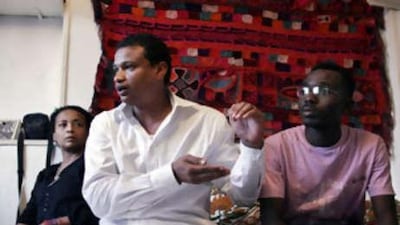CAIRO // For many Sudanese living in Egypt, the genocide charges brought against Sudan's president by the prosecutor of the International Criminal Court is less a violation of Sudan's sovereignty than long overdue justice. Since July 14, when Luis Moreno-Ocampo, the ICC prosecutor, filed 10 charges of genocide and crimes against humanity in Darfur against Omar al Bashir, the Sudanese president, the subject of conversation among Egypt's Sudanese community has hardly veered from the goings-on in their homeland.
"As a Sudanese, I'm happy that finally justice will be enforced in Sudan," said Ammar Nagm al Din Hussein, 32, a lawyer from Khartoum, who fled Sudan four months ago after being released from jail, where he said he was imprisoned for being a suspected member of a rebel group. "While in prison, I heard about people who committed suicide to escape torture there, others just disappeared," he said at a Sudanese clothes shop in downtown Cairo, revealing what he said were cigarette burns on his back.
"I'm very relieved that finally [Omar al Bashir] will stand criminal trial," said Mohammed Saleh Adam, 28, from Darfur. "The crimes he committed in Darfur are very well known, there is no doubt about them." African Union leaders on Monday asked the UN Security Council to delay the prosecution by the ICC, in order not to disrupt the current peace efforts. "The African Union requests the UN Security Council to defer the process initiated by the ICC, taking into account the need to ensure that the ongoing peace process is not jeopardised," Ojo Maduekwe, the Nigerian foreign minister, told reporters on Monday.
Amr Moussa, the Arab League chief, backed the AU initiative to stall possible legal action against Mr Bashir. "I personally do. Yes, the Arab League also believes that is important," Mr Moussa said following two meetings with Mr Bashir in less than 24 hours when he was asked about the call from the African Union. The charges against Mr Bashir come a year after the court indicted Ahmed Harun, Sudan's humanitarian affairs minister, who was formerly in charge of security in Darfur; and Ali Kushayb, a suspected militia leader, on crimes against humanity.
"If Bashir is so sure of himself, why doesn't he stand trial to clear himself," said Mohammed al Haqqar, in his twenties, from Darfur. "Everybody knows that al Bashir as the head of armed forces is not only responsible for the horrors in Darfur, he ordered them." As of 2006 about 60,000 Sudanese refugees had registered with the UN High Commissioner for Refugees in Cairo, though the vast majority of Sudanese in Egypt are not registered, and their number is believed to be much more than that.
Fateh Azzam, the director of Forced Migration and Refugee Studies at the American University in Cairo, has said there are between two and four million Sudanese living in Egypt. Many come from the Darfur region in western Sudan where the violence has been most intense. The current conflict began in 2003 when the two main non-Arab rebel groups - the Justice and Equality Movement and the Sudan Liberation Movement - took up arms against what they said was government oppression and neglect of black Sudanese.
According to the United Nations, 300,000 people have been killed and 2.5 million driven from their homes. Moreover, the vast majority of black Sudanese have been targeted by the Arab-government-backed Janjaweed militias, in what the United Nations and other rights groups consider to be genocide. The mass influx of Sudanese into Egypt since the beginning of the conflict has led to racial tension in the country, and Sudanese regularly complain of discrimination and abuse, including a police raid on a protest in a Cairo suburb in Dec 2005 that left at least 100 refugees dead, according to rights groups.
Egyptian and Arab commentators are divided on the ICC's prosecution of Mr Bashir, and its implications for other Arab leaders. "The list of charges against al Bashir remains a chapter of human tragedy in Darfur, but it's also an evidence of crimes committed by governments against their people, while hiding behind claims of Arab solidarity, which in reality is nothing but Arab complicity," said Salama Ahmed Salama, one of Egypt's best-known columnist.
Adel Hamouda, editor of the Egyptian independent weekly Al Fagr, was more emphatic about the charges. "The criminal trial of a butcher like al Bashir is a victory for the dignity of oppressed people and sets an example to his kind of Arab leaders," he said. Others said the prosecution of a sovereign Arab leader was merely a sign of western imperialism. "The Arab community is disintegrating thanks to its current leaders, who humiliate it by their complete surrender to the American and Israeli dictation," wrote Abdel Bari Atwan, editor of the London-based pan Arab daily Al Quds Al Arabi.
Mohammed Mahdi Akef, supreme leader of the Muslim Brotherhood, agreed. "Why no order was issued against Bush, Cheney and Rumsfeld who killed thousands of innocent civilians in Iraq and Afghanistan?" he said in a statement. "History is repeating itself, but we haven't learnt the lesson. Yesterday it was Saddam, today is al Bashir and we don't know who is next." And even among the Sudanese living in Cairo, not all are so enthused about the ICC's prosecution.
"The last time they carried out this scenario, they slaughtered Saddam Hussein like a sheep in Eid al Adha," said Yasmine Hakem, 41, an Arab Sudanese who grew up in Egypt. "Why don't they punish Bush for what he's doing in Iraq?" she said. @Email:nmagd@thenational.ae * With additional reporting by Agence France-Presse

